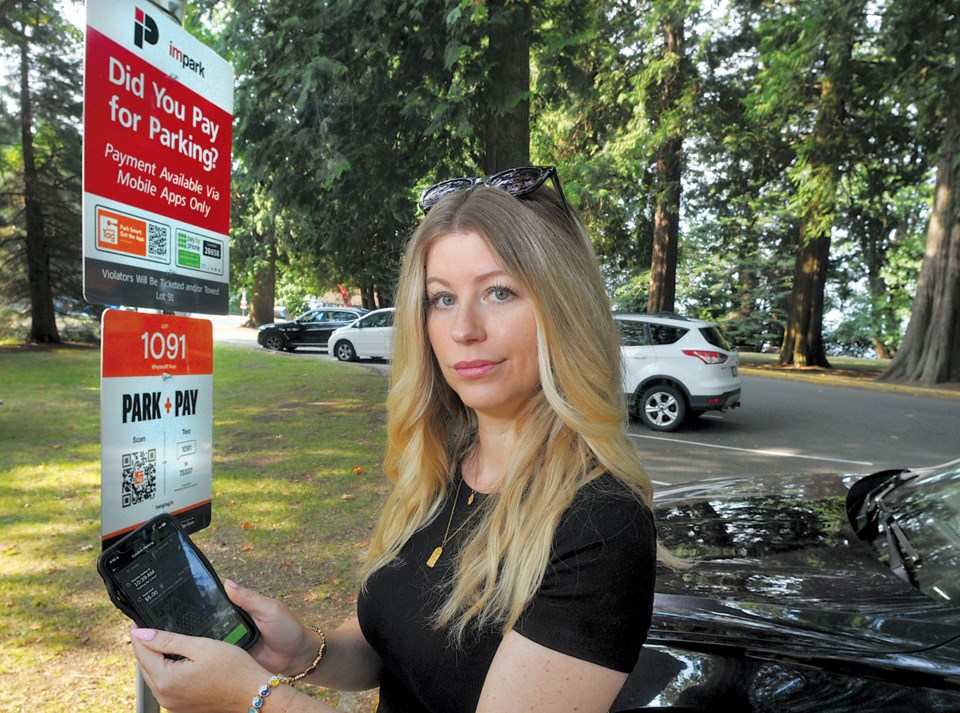A pilot program to introduce pay parking in three West Vancouver parks has netted more than $184,000 in just the first four months of operation. And district council has indicated it’s keen to expand the lucrative plan to as many as five more parks.
But the new parking program isn’t without its critics.
Several park users have complained that cell coverage needed to use the virtual-only pay parking options is weak to nonexistent in some parks, making for a frustrating experience.
Other people say the lack of physical parking meters is a deterrent to older people who may not be as adept with cellphones and apps.
Several groups have also requested that they be given the same $20 annual permit option as West Vancouver residents – something council will likely consider in the fall.
In the meantime, several park users say it would be helpful if they could use the pay parking system more easily.
Cell signal strength a problem
Elliott Best said his choice of Lighthouse Park as a spot to propose to his girlfriend (now fiancée) almost got derailed recently when he couldn’t get a strong enough signal to use the parking app.
Best said the couple arrived at the park to walk their dog and after nabbing one of the last available parking spots, tried both pay parking apps. “We couldn’t connect,” he said.
Eventually they walked closer to the park entrance and “we were probably standing there for 10 or 15 minutes” getting the app to load on their phones.
“I was really surprised they didn’t have any physical machines,” he said. “A lot of the parks are off on the edges [of the district] where cell service isn’t quite as good.”
Spencer Capier, president of the West Vancouver Teachers Association, said he’s had similar frustrations. Capier said he’s usually not able to get a signal on his Telus phone service in Lighthouse Park and has resorted to paying ahead while still at his West Vancouver office.
“If you’re a casual user of the park, it’s a bit like saying, ‘We actually don’t want you there. We would prefer if you didn’t show up,’” he said.
Exemptions requested
As president of the teachers union, Capier has also written to West Vancouver Mayor Mark Sager, asking that teachers who work in the district be able to buy annual $20 permits, like residents. But he said he’s still waiting for an answer.
Most teachers, first responders and even district employees aren’t West Vancouver residents, he added.
In a recent staff report on the first four months of the program, Jenn Moller, director of engineering, told council “We’ve had quite a few requests from various groups” for exemptions, ranging from business operators to non-profit and community groups.
A cursory look at other parks systems showed exemptions for veterans and people with disabilities are those most granted, she said.
Moller added, however, that exemptions are complex and need to take issues like equity, impacts on revenue and how easy they would be to administer into account.
Park user Jackie Patton said there’s one large group that’s already disadvantaged by the new pay parking system – elderly people who may not have an easy time dealing with cellphone apps.
Patton said her mom – a North Vancouver retiree – recently went to Whytecliff Park but “she couldn’t figure out how to do it on her phone” so “she just left.”
Patton said when she visited the park herself a few weeks later, she was surprised to find no parking machines. “My mom would never know to scan a QR code with her cellphone,” she said
According to Moller’s staff report, upfront cost is the reason the district hasn’t installed physical parking machines in parks.
Currently, to park at Lighthouse Park, Nelson Canyon and Whytecliff Park, visitors must either scan a QR code posted on signs in the parking lot and pay online, or use the hangTag or PayByPhone smartphone apps.
According to the staff report, a contractor tested cell phone signal strength in the parks before the program started. But Moller acknowledged “signal strength did vary by park location and throughout the parks themselves,” as well as by cellphone provider. The district’s IT department is now doing follow-up testing, she said. “We do know there are some inconsistencies,” she said.
Revenue expected to be double first estimate
While the district initially estimated pay parking would bring in about $255,000 a year, based on initial data, that number is now expected to be closer to $500,000, said Moller – with the potential to add more.
A staff report showed 87 per cent of revenue for the program came from pay parking, while 12 per cent came from resident permits and one per cent came from violation tickets.
Lighthouse Park was the biggest money maker, according to the report, pulling in revenue of more than $102,000 in four months from its 82 parking stalls, while Whytecliff Park garnered $62,558 from its 129 stalls and Nelson Canyon brought in $21,705 from its 42 parking spots.
About 15 per cent of revenue went to pay expenses, including the enforcement contract with Imperial Parking.
During discussion on the issue July 22, Coun. Sharon Thompson said she’d like to remove the annual fee for residents. But Coun. Nora Gambioli was opposed to that. “Twenty dollars is nothing,” she said.
Council is expected to consider another staff report on the issue in the fall which will also examine the possibility of expanding the pay parking program to Seaview Walk, Ambleside, Dundarave, John Lawson and Cypress Falls parks.
Coun. Christine Cassidy said the move to pay parking in West Vancouver parks is overdue. “We are the last community in the Lower Mainland to have pay parking,” she said.




